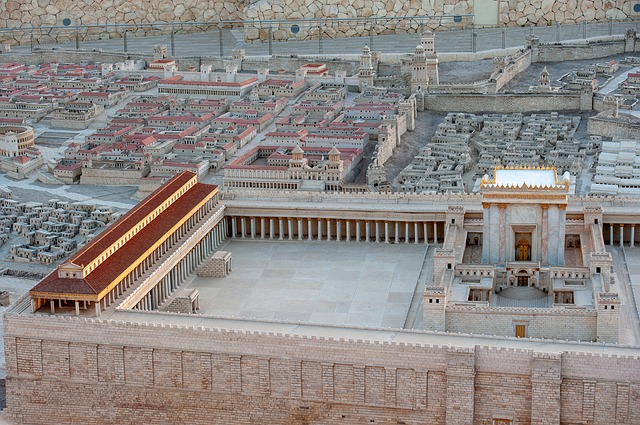
18 Then the glory of the Lord went out from the threshold of the house, and stood over the cherubim. 19 And the cherubim lifted up their wings and mounted up from the earth before my eyes as they went out, with the wheels beside them. And they stood at the entrance of the east gate of the house of the Lord, and the glory of the God of Israel was over them. – Ezekiel 10:18-19
Good-Bye
It was time to say good-bye. God did not want to overstay His welcome. Israel had what would appear to be an easy choice before them. They could choose between the presence of God or the judgment of God. They chose the latter. God had warned them of the consequences of idolatry. They did not take Him seriously. Despite the warnings of the Prophets like Jeremiah and Ezekiel, the people assumed they were immune from devastation because of God’s presence among them (Jeremiah 7:4). Little did they imagine God would remove His presence. But that is what Ezekiel records in this passage. In his vision, God tells a man in fine linen to fill his hands with burning coals from between the cherubim and scatter them over the city. The burning coals that the Seraphim used to purge Isaiah’s unclean lips would now be used to judge Jerusalem. It is scary when God leaves us to wallow in the consequences of our sins.
With You
“I am God, the God of your father. Do not be afraid to go down to Egypt, for there I will make you into a great nation. 4 I myself will go down with you to Egypt, and I will also bring you up again, and Joseph’s hand shall close your eyes.” – Genesis 46:3-4
God spoke to Abraham, Isaac, and Jacob. He made a covenant with them. He promised them a land. Egypt wasn’t it. Despite the fact that Joseph was in Egypt, Jacob was reluctant to make the journey. But God promised Jacob that He would “personally” accompany him on the journey and in time, bring him back again. The promise of His presence was good enough for the aged Jacob. Down to Egypt, he went.
11 But Moses said to God, “Who am I that I should go to Pharaoh and bring the children of Israel out of Egypt?” 12 He said, “But I will be with you, and this shall be the sign for you, that I have sent you: when you have brought the people out of Egypt, you shall serve God on this mountain.” – Exodus 3:11-12
I Am
With the passage of time, the work of Joseph was forgotten and favor became slavery. As promised, the nation of Israel grew while in Egypt, but their growth became a threat. Out of their dread for the Israelites, the Egyptian’s decided to “afflict them heavy burdens” and “made their lives bitter with hard service”. Under this oppression, the people of Israel groaned and cried out for help. God heard their cry for rescue, and remembered His covenant with Abraham, Isaac and Jacob. “God saw the people of Israel—and God knew” (Exodus 2:25). Rescue was coming in the form of Moses. But first God had to encourage Moses with the promise of His presence. The great “I Am” who accompanied Israel down to Egypt would now go with Moses to deliver the nation of Israel from there. Back to Egypt Moses went.
6 Say therefore to the people of Israel, ‘I am the Lord, and I will bring you out from under the burdens of the Egyptians, and I will deliver you from slavery to them, and I will redeem you with an outstretched arm and with great acts of judgment. 7 I will take you to be my people, and I will be your God, and you shall know that I am the Lord your God, who has brought you out from under the burdens of the Egyptians. 8 I will bring you into the land that I swore to give to Abraham, to Isaac, and to Jacob. I will give it to you for a possession. I am the Lord.’” – Exodus 6:6-8
Shekinah Glory
The Israelites groaned for deliverance, but when the deliverer came, they did not believe him. God tried to alleviate their fears with His promised presence, but their spirits were broken because of their harsh slavery. Ready or not to believe, after a series of plagues manifesting the power of God, out of Egypt Israel would go guided by the Shekinah Glory.
51 And on that very day the Lord brought the people of Israel out of the land of Egypt by their hosts. – Exodus 12:51
As a pillar of cloud by day, to block the heat of the sun, and as a pillar of fire by night, to provide heat and light, God led His people. They needed guidance and comfort. His presence provided both. When the Egyptians pursued them to the Red Sea, they needed safe passage and protection. God told them to fear not, to stand back, and to witness the salvation of the Lord. The same waters that parted for the Israelites drowned the Egyptians. The salvation of the Lord is an awesome thing to witness.
Promised Presence
8 And let them make me a sanctuary, that I may dwell in their midst. – Exodus 25:8
God gave the Israelites water from the rock. He gave them manna from Heaven. He gave them the law at Mount Sinai. Now it was time for the promise of His presence. When He gave Moses the Law, God also gave him the plans for a sanctuary. The sanctuary would reflect the holiness of God. It would be a place of sacrifice and worship. Although the plans were made by God, the people would have to donate their money for its construction. Although the tabernacle was modest, it laid the groundwork for the future Temples. Items of spiritual significance such as the Ark of the Covenant, the Mercy Seat, Table for Bread, and the Golden Lampstand would be housed in the tabernacle. But most important to the Jews was the fact that God would dwell in their midst. At least it should have been.
When God Leaves
21 For although they knew God, they did not honor him as God or give thanks to him, but they became futile in their thinking, and their foolish hearts were darkened. 22 Claiming to be wise, they became fools, 23 and exchanged the glory of the immortal God for images resembling mortal man and birds and animals and creeping things. 24 Therefore God gave them up in the lusts of their hearts to impurity…26 For this reason God gave them up to dishonorable passions…28 And since they did not see fit to acknowledge God, God gave them up to a debased mind… – Romans 1:21-24a, 26a, 28a
As the nation of Israel learned, it is scary when God leaves us to wallow in the consequences of our sins. The humble wilderness tabernacle eventually gave way to the majestic Temples built by Solomon and Herod. Each of which would be destroyed by Israel’s enemies. Both destructions were forwarned by God despite the disbelief of the Israelites. Ezekiel’s vision of the Glory of God leaving the Temple reminds us of the consequences of sin. Romans chapter one shows us just how depraved men can become when God removes his intervention from their lives. Knowing our propensity towards “futile thinking” and “foolish hearts” makes us thankful for the work and words of Christ and the indwelling of the Holy Spirit.
16 Do you not know that you are God’s temple and that God’s Spirit dwells in you? – 1 Corinthians 3:16
5 “I will never leave you nor forsake you.” – Hebrews 13:5b





